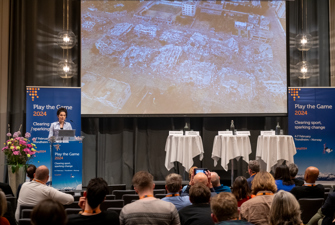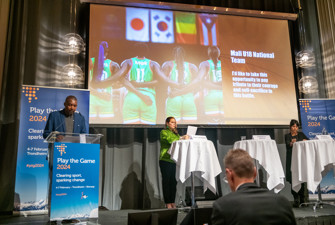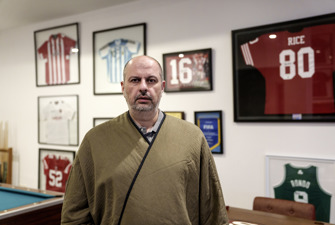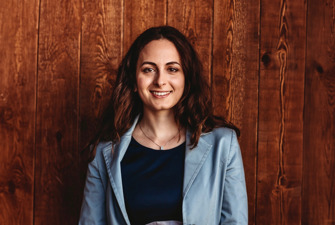EURO 2024 sponsors linked to forced labour and pornographic content for minors
The list of EURO 2024 sponsors raises critical questions about UEFA's ethical evaluation of its partners and due diligence processes. Stanis Elsborg investigates the controversies surrounding the Chinese sponsors of UEFA's flagship event which include issues of Uyghur forced labour, access to pornographic content for minors, illegal subsidies, and concerns over facial recognition software.
Alipay. BYD. AliExpress. Vivo. If you’ve been following the UEFA EURO 2024, these Chinese companies are hard to miss as they dominate the stadium banners.
While international sports federations have long engaged with autocratic regimes and accepted sponsorships from such countries, the trend has intensified as an increasing number of sponsors from outside Europe are entering European sports.
The ongoing EURO 2024 is a case in point with a significant portion of sponsors hailing from China, alongside Qatari state-owned entities like Qatar Airways and Visit Qatar. UEFA's flagship event, therefore, appears less European on the sponsorship side and more entangled in the geopolitical interests of autocratic regimes.
Some of these sponsorships raise serious concerns and call UEFA's credibility and ethical standards into doubt. The sponsors are linked to a wide range of contentious issues such as allegations of mass labour abuses of Uyghurs, pornographic content for minors to illegal subsidisation, political interference, and fundamental human rights violations. This isn't just a game - it's a high-stakes intersection of sports, politics, and human rights where the integrity of sports clashes with grave ethical issues.
AliExpress under fire: Pornographic content for minors and fake medicine
On March 27, 2024, UEFA announced AliExpress as an official partner for UEFA EURO 2024, providing the Chinese e-commerce platform prime commercial exposure to the world and a unique opportunity to reach the European market. The announcement came only two weeks after the European Commission launched a formal investigation into the platform over concerns about illegal content.
Key issues include the platform's failure to enforce its own terms of service, posing risks to consumers’ health by selling fake medicine and food as well as dietary supplements. The European Commission also highlighted that AliExpress still allows pornographic material on the platform and that it is possible for minors to access the material. Already in 2022, the Biden Administration added AliExpress to an annual list of markets that the United States identifies as engaging in counterfeiting and copyright violations.
Nevertheless, UEFA has chosen AliExpress as its sponsor for EURO 2024, and the platform received further backing when David Beckham, one of the most prominent figures in world sports marketing, was announced as their global ambassador in late May 2024.
Such collaboration raise significant concerns about UEFA’s ethical compass and due diligence in terms of sponsorship agreements - not least because of its agreement from 2022 with the European Commission where UEFA pledge to “promote European values and objectives through the power of football", including "protection of minors, good governance in sport, and human rights."
China is watching you
But the concerns don’t end here. UEFA has also entered into partnerships with companies owned by Chinese global trading platform Alibaba. UEFA partnered with the payment platform Alipay in November 2018 and in 2021, UEFA announced a new UEFA EURO 2020 partnership with blockchain company AntChain, run by an Alibaba affiliate company, Ant Group.
This latter partnership was renewed and strengthened in 2023, coinciding with UEFA’s engagement with AliExpress, is underscoring UEFA’s increasingly close relationship with China. Alibaba is also a major sponsor of the Olympic Games – a sponsorship that lasts until 2028.
In a 2024 financial statement, Alibaba disclosed that numerous entities within its business empire are partially owned by Chinese state-owned enterprises. This highlights Alibaba’s extensive ties to the Chinese government and is especially concerning in light of concerns that Alibaba is involved with offering facial recognition software solutions.
In December 2020, the US-based surveillance research firm IPVM released a report which revealed that Alibaba, the parent company of UEFA and EURO 2024 sponsors Alipay and AliExpress, offered facial recognition software to its clients which was capable of identifying ethnic minorities and was specifically set up to search for Uyghurs.
Alibaba quickly responded to the allegations, stating that it ”stopped trying to identify faces by ethnicity after the company was accused this week of creating a facial recognition system meant to detect Uyghurs”.
The many Chinese sponsors are not just visible on stadium banners but also during each press conference. Photo: Harriet Lander / UEFA / Getty Images.
The Chinese government has forcibly detained hundreds of thousands of Uyghurs and others in indoctrination camps under the guise of an anti-terrorism campaign, and facial recognition and surveillance played a central part in this oppressive system.
In April 2021, Human Rights Watch published a damning report on the Chinese government’s crimes against humanity in Xinjiang. The report detailed mass arbitrary detention, torture, mass surveillance, cultural and religious erasure, family separations, forced labour, and sexual violence against Uyghurs and other Turkic Muslims. This situation has led the United States and numerous international human rights organisations to label the situation as a form of genocide and “crimes against humanity.”
Alongside this, a vast surveillance network using facial recognition and genetic testing has been deployed to monitor these groups. The United States and other countries have condemned the program, imposing penalties on Chinese companies believed to be involved.
The Covid-19 pandemic as a cover up?
During the Covid-19 pandemic, Alipay faced significant scrutiny over allegations that its software was used to enforce strict quarantines on the Chinese population.
When people in China signed up to the Alipay app, they were assigned a colour code by the Chinese government – green, yellow, or red – that indicated their health status. The Chinese government demanded the population to use this software on smartphones, which allowed the authorities to track people’s movements over time and dictate whether they should be quarantined or allowed into subways, malls and other public spaces.
A New York Times analysis of the software revealed that it not only assessed contagion risk but also shared data with the police and transmitted data to law enforcement, and thereby set a troubling precedent for automated social control.
Maya Wang, senior China researcher for Human Rights Watch, warned that the coronavirus outbreak would likely accelerate the expansion of China's surveillance regime, similar to what occurred after the 2008 Beijing Olympics and the 2010 Shanghai Expo. And as already highlighted, surveillance in China has only strengthened in recent years.
Uyghur forced labour: EURO 2024 on the spot
There are also links between some EURO 2024 sponsors and the practice of forced labour in China.
According to a 2020 March report by the Australian Strategic Policy Institute (ASPI), the Chinese government compels thousands of Uyghurs to work as forced labour in factories across the country. The report, 'Uyghurs for Sale', reveals that prominent global brands in the clothing, technology, and automotive sectors are implicated.
Vivo, a Chinese multinational technology company and EURO 2024 sponsor, is among those who reportedly benefit directly or indirectly from using Uyghur workers.
Vivo takes centre stage after each match when ‘Vivo Player of the Match’ is awarded. Photo: Matt McNulty / UEFA / Getty Images
BYD, a leading Chinese electric vehicle manufacturer and EURO 2024 sponsor, has also been implicated in using aluminium made by Uyghur forced labour, according to a February 2024 report by Human Rights Watch.
But this is not the only controversy surrounding BYD, a company that has overtaken Tesla as the world’s top selling electric carmaker.
Subsidy accusations: Are UEFA contributing to an uneven playing field?
In October 2023, the European Commission began investigating imports of battery electric vehicles (BEVs) from China to determine if they benefitted “from illegal subsidisation and whether this subsidisation causes or threatens to cause economic injury to EU BEV producers.”
Announcing the investigation, European Commission President Ursula von der Leyen emphasised the importance of fair competition and stated that “Wherever we find evidence that their efforts are being impeded by market distortions and unfair competition, we will act decisively.”
Although BYD wasn't explicitly mentioned initially in the Commission's press release, its significant market presence and previous reports about BYD benefitting from lavish support from the Chinese government made it a likely suspect.
Notwithstanding these suspicions, UEFA announced BYD as an official partner and the official E-Mobility Partner of UEFA EURO 2024 only a few months later, in January 2024. The announcement highlighted how “BYD will contribute to UEFA’s goal of organising the most sustainable European Championship to date … BYD will also showcase its latest NEV models and cutting-edge technologies at selected UEFA EURO 2024 venues.”
In April 2024, the German Kiel Institute for the World Economy published a study which revealed that BYD received about 220 million euros in direct government subsidies from China in 2020, with that figure rising to 2.1 billion euros in 2022. The report highlighted that state subsidies to BYD have significantly enhanced their competitiveness both within China and globally.
BYD is very visible during this year’s UEFA EURO 2024. Photo: Dan Mullan / Getty Images.
Then, one week before the start of EURO 2024, the European Commission “provisionally concluded that the battery electric vehicles (BEV) value chain in China benefits from unfair subsidization, which is causing a threat of economic injury to EU BEV producers.” This time, the press release clearly mentioned BYD. Yet, there has been no reaction from UEFA, and as EURO 2024 unfolds, BYD's presence is prominently visible throughout the German cities hosting the tournament and on stadiums.
The EURO 2024 might be a billion-dollar industry, projected to hit 2.7 billion US dollars in revenue, but UEFA claims to be more than just a commercial entity. As the European football governing body, it asserts a commitment to promote a distinct set of European values while also embedding integrity and human rights into its operational framework. The high sums involved make the sponsorships even more controversial.











